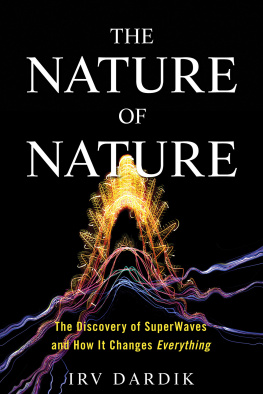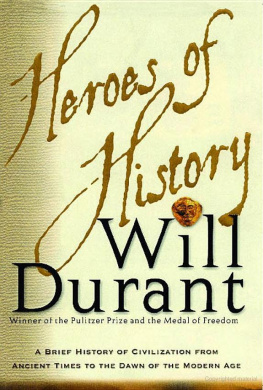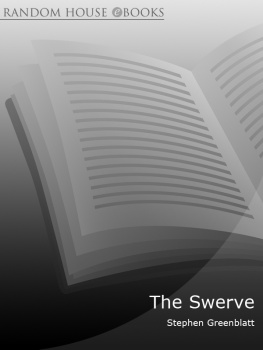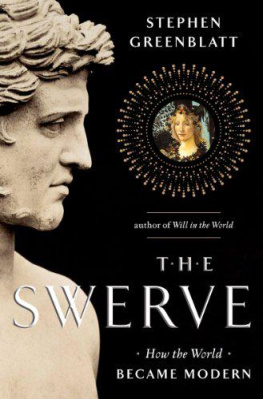CONTENTS
About the Book
One of the worlds most celebrated scholars, Stephen Greenblatt has crafted both an innovative work of history and a thrilling story of discovery, in which one manuscript, plucked from a thousand years of neglect, changed the course of human thought and made possible the world as we know it.
Nearly six hundred years ago, a short, genial, cannily alert man in his late 30s took a very old manuscript off a library shelf, saw with excitement what he had discovered, and ordered that it be copied. The book was the last surviving manuscript of an ancient Roman philosophical epic, On the Nature of Things, by Lucretius a thrillingly beautiful poem of the most dangerous ideas: that the universe functioned without the aid of gods, that religious fear was damaging to human life, and that matter was made up of very small particles in eternal motion.
The copying and translation of this ancient book, the greatest discovery of the greatest book-hunter of his age, fueled the Renaissance, inspiring artists such as Botticelli and thinkers such as Giordano Bruno; shaped the thought of Galileo and Freud, Darwin and Einstein; and had revolutionary influence on writers from Montaigne to Thomas Jefferson.
About the Author
Stephen Greenblatt is the John Cogan University Professor of the Humanities at Harvard University and is the founder of the school of literary criticism known as New Historicism. As visiting professor and lecturer at universities in England, Australia, the United States and elsewhere throughout the world, he has delivered such distinguished series of lectures as the Clarendon Lectures at Oxford and the University Public Lectures at Princeton. He has received two Guggenheim Fellowships and has been President of the Modern Language Association. Professor Greenblatt is the author and co-author of nine books and the editor of ten others, including The Norton Anthology of English Literature (7th edition) and The Norton Shakespeare .
ALSO BY STEPHEN GREENBLATT
Shakespeares Freedom
Will in the World: How Shakespeare Became Shakespeare
Hamlet in Purgatory
Practicing New Historicism (with Catherine Gallagher)
Marvelous Possessions: The Wonder of the New World
Learning to Curse: Essays in Early Modern Culture
Shakespearean Negotiations:
The Circulation of Social Energy in Renaissance England
Renaissance Self-Fashioning: From More to Shakespeare
Sir Walter Ralegh: The Renaissance Man and His Roles
Three Modern Satirists: Waugh, Orwell, and Huxley
EDITED BY STEPHEN GREENBLATT
Cultural Mobility: A Manifesto
The Norton Anthology of English Literature (general editor)
The Norton Shakespeare (general editor)
New World Encounters
Redrawing the Boundaries: The Transformation of English and American Literary Studies
Representing the English Renaissance
Allegory and Representation
To Abigail and Alexa
PREFACE
WHEN I WAS a student, I used to go at the end of the school year to the Yale Coop to see what I could find to read over the summer. I had very little pocket money, but the bookstore would routinely sell its unwanted titles for ridiculously small sums. They would be jumbled together in bins through which I would rummage, with nothing much in mind, waiting for something to catch my eye. On one of my forays, I was struck by an extremely odd paperback cover, a detail from a painting by the surrealist Max Ernst. Under a crescent moon, high above the earth, two pairs of legsthe bodies were missingwere engaged in what appeared to be an act of celestial coition. The booka prose translation of Lucretius two-thousand-year-old poem On the Nature of Things (De rerum natura)was marked down to ten cents, and I bought it, I confess, as much for the cover as for the classical account of the material universe.
Ancient physics is not a particularly promising subject for vacation reading, but sometime over the summer I idly picked up the book and began to read. I immediately encountered ample justification for the erotic cover. Lucretius begins with an ardent hymn to Venus, the goddess of love, whose coming in the spring has scattered the clouds, flooded the sky with light, and filled the entire world with frenzied sexual desire:
First, goddess , the birds of the air, pierced to the heart with your powerful shafts, signal your entry. Next wild creatures and cattle bound over rich pastures and swim rushing rivers: so surely are they all captivated by your charm, and eagerly follow your lead. Then you inject seductive love into the heart of every creature that lives in the seas and mountains and river torrents and bird-haunted thickets, implanting in it the passionate urge to reproduce its kind.
Startled by the intensity of this opening, I continued on, past a vision of Mars asleep on Venus lapvanquished by the never-healing wound of love, throwing back his handsome neck and gazing up at you; a prayer for peace; a tribute to the wisdom of the philosopher Epicurus; and a resolute condemnation of superstitious fears. When I reached the beginning of a lengthy exposition of philosophical first principles, I fully expected to lose interest: no one had assigned the book to me, my only object was pleasure, and I had already gotten far more than my ten cents worth. But to my surprise, I continued to find the book thrilling.
It was not Lucretius exquisite language to which I was responding. Later I worked through De rerum natura in its original Latin hexameters, and I came to understand something of its rich verbal texture, its subtle rhythms, and the cunning precision and poignancy of its imagery. But my first encounter was in Martin Ferguson Smiths workmanlike English proseclear and unfussy, but hardly remarkable. No, it was something else that reached me, something that lived and moved within the sentences for more than 200 densely packed pages. I am committed by trade to urging people to attend carefully to the verbal surfaces of what they read. Much of the pleasure and interest of poetry depends on such attention. But it is nonetheless possible to have a powerful experience of a work of art even in a modest translation, let alone a brilliant one. That is, after all, how most of the literate world has encountered Genesis or the Iliad or Hamlet, and, though it is certainly preferable to read these works in their original languages, it is misguided to insist that there is no real access to them otherwise.
I can, in any case, testify that, even in a prose translation, On the Nature of Things struck a very deep chord within me. Its power depended to some extent on personal circumstancesart always penetrates the particular fissures in ones psychic life. The core of Lucretius poem is a profound, therapeutic meditation on the fear of death, and that fear dominated my entire childhood. It was not fear of my own death that so troubled me; I had the ordinary, healthy childs intimation of immortality. It was rather my mothers absolute certainty that she was destined for an early death.













